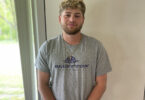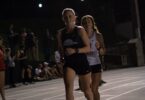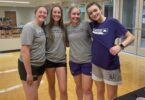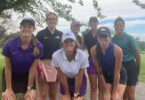On March 13, 2020, the National Collegiate Athletic Association Division III Administrative Committee granted an extra season of eligibility for student-athletes participating in spring sports during the COVID-19 outbreak. In order for athletes to use this extra eligibility, they will have to go to school for a fifth-year and be a fifth-year senior or they will have to enroll in grad school to use the last year of eligibility.
As a student-athlete at Bluffton University, I agree with the idea of giving eligibility back to these athletes. Although this decision does not affect my eligibility, I know I would not be able to come back for a fifth-year. After hearing of this decision by the NCAA Division III Administrative Committee through the Heartland Conference Twitter page, I emailed some of the spring senior athletes and coaches and asked them about this decision.
Out of the four athletes who participate in the spring sports only one of them said they would come back for sure to use the eligibility given back to them— senior baseball player Parker Reynolds. He told me he will return to pursue his master’s degree along with using his extra year of eligibility.
“It has definitely been difficult to not play this season,” said Reynolds. “But I’ve been staying busy with workouts and school.”
Ciana Hostetler, one of the seniors on the Beavers track and field team, does not think she will be coming back to use the eligibility. Although Hostetler will miss being on the track, she believes it is a good thing to give the student-athletes the opportunity to use this eligibility if they choose to, especially for those student-athletes who are already planning on getting their masters or going for a fifth year.
Justin Kauffman, senior pole vaulter for the Beavers said financially it would not make sense for him to come back and use his eligibility but he may continue to compete throughout the summer and into the winter if he can stay in his vaulting shape.
“I really would like to come back and compete a few more times,” said Kauffman. “But in order for that to happen the NCAA and HCAC would have to allow all athletes to compete in their spring seasons without being enrolled at the university and that goes against everything that they stand for. My plan right now is continue vaulting if I stay in shape and potentially compete at some meets over the summer or at a few winter meets. If that doesn’t work out, then I guess everyone has to hang up their spikes at some point and my day just came a little sooner than I expected it.”
Senior softball player Caylin Morstadt said she has already been applying for education jobs and does not think she will use her eligibility. Morstadt said if she were to get her master’s it would be harder to find a job because she would have to have a higher salary because of her education. Although Morstadt believes it is good to give athletes the ability to come back and play shows there is care for the student-athletes.
Morstadt had an idea about moving the season that could be a help for students who want to come back and play but does not make sense either financially for them to come back for a full year. Morstadt thought about moving the softball season to the fall to make up for this season’s cancellation.
“I do think it is an interesting idea of taking the softball season and moving it to the fall,” said Morstadt. “I know this is very unlikely due to athletes who play multiple sports, but if softball was this coming fall, I would be more likely to come back due to only paying for one semester and then being able to be a substitute teacher in the spring.”
Although this idea has not been talked about I believe it could be financially helpful for many students who would want to come back and take part in their season but do not have the funds to do so because there are no athletic scholarships for Division III athletes.
I believe the NCAA has done a good job in making it a possibility for student-athletes to compete and use the eligibility they were granted if they have the opportunity to use. I believe with Division III athletics not being able to give away scholarships it is going to cripple the number of students who do return to play in their final season merely because of the cost it is to go to school.
The head coaches for all the spring sports all had their varying opinion on the NCAA ruling. They all fully supported the decision made by the NCAA to extend the eligibility for spring athletes.
Head Softball Coach Amanda DeMoine said it was necessary for the NCAA to give this eligibility to all the student-athletes because it was not just the senior class who lost their season.
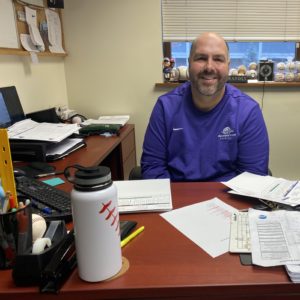
Bluffton University Head Baseball Coach James Grandey photo by Trent Mast.
Head Baseball Coach James Grandey also believes this course of action was necessary. Grandey said he does not believe the NCAA will change the rules in which it means to be eligible. As in the number of hours registered to be a full-time student and the rule that there are 10 semesters in which someone can compete through eight of those semesters.
Director of Track and Field Kaylea Jachno has the opposite opinion as Grandey. Jachno believes because Division I and Division II athletes can be on scholarship their opportunity to come back and compete is higher because they all do not have to worry about the financial strain if they are on scholarship.
“Like most all NCAA rules there are variances on different levels,” said Jachno. “I think that there should be some accommodation for DIII such as reduced required credits to be eligible to compete. AKA you can compete even as a part-time student.”
There are many different ways to go about this ruling and rework it to make it easier for the student-athletes and many people have been thinking about a way to make it work. Being a student-athlete you never expect your season or career to end so abruptly, especially when what happens is out of your control.
I would like to believe the NCAA will try to work on a way to help these athletes compete one more time, whether they help financially or like Jachno said reducing the required credits a student has to take to still compete.
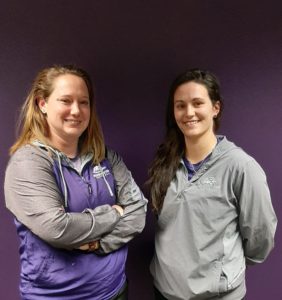
Head Softball Coach Amanda DeMoine and Assistant Coach Hannah Tarski photo by Sarah Heydinger.
Never knowing when your last competition is going to be is hard for any athlete. I had my high school wrestling career end due to an injury my senior year while I was ranked in the top eight in the state of Ohio. Although I cannot say I know what it is like to lose a season the way these athletes did I hope they all can find a way to come back and compete one more time as a Bluffton University Beaver.
“I do believe the providing this opportunity to come back and play is great,” said DeMoine. “But there is still going to be a large percentage of student-athletes that saw their careers come to an end, potentially playing their last games without even knowing it.”

